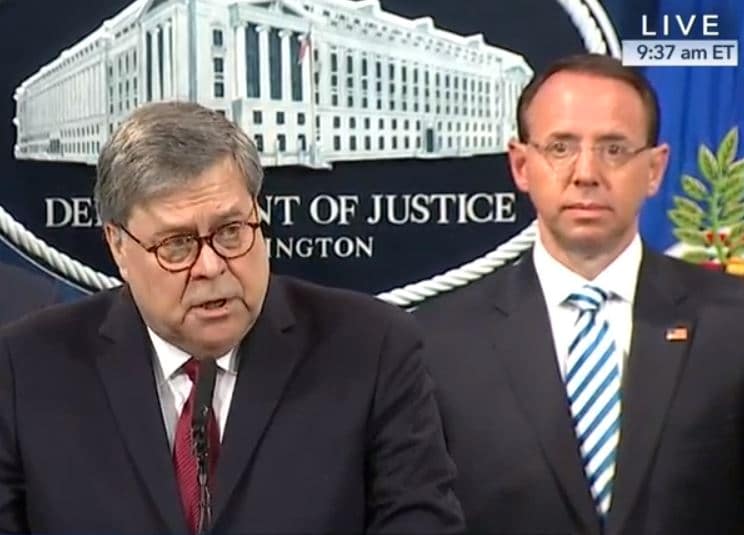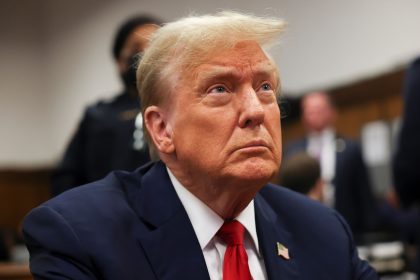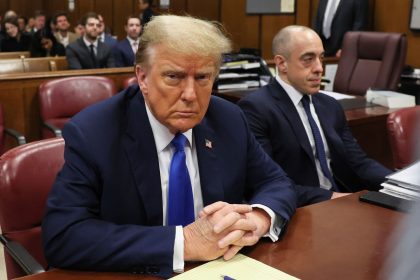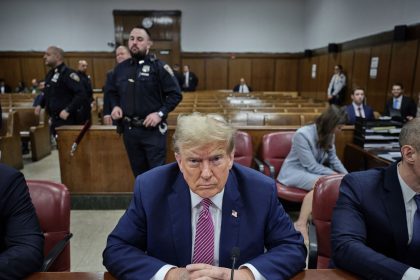DOJ Must Release Barr-Era Memo on Possible Trump Prosecution

WASHINGTON — The Justice Department must release in full a legal memo that then-Attorney General William Barr claimed played a role in his deciding not to charge then-President Trump on the basis of Special Counsel Robert Mueller’s investigation into interference in the 2016 presidential election.
In a unanimous opinion handed down on Friday, a three-judge panel of the U.S. Court of Appeals for the D.C. Circuit held the document actually had nothing to do with whether to charge Trump with obstruction of justice, but “instead concerned an entirely different decision — “what, if anything, to say to Congress and the public about the Mueller report.”
The ruling harkens back to the stormy weeks after Mueller and his investigators submitted their 448-page report to Barr, on March 22, 2019, and a redacted version of the same was released to the public on April 18, 2019.
The first volume detailed Mueller’s investigation into election interference, while the second volume concerned whether Trump had obstructed justice in his actions concerning the election-interference inquiry.
As recounted by Chief Circuit Judge Sri Srinivasan, an Obama nominee, and Circuit Judges Judith Rogers and David Tatel, both nominees of Bill Clinton, Barr waited two days after receiving the then-confidential Mueller report before sending a letter to Congress providing his overview of its contents.
With respect to the second part, Barr explained that Mueller did not reach a conclusion on whether Trump’s actions amounted to obstruction of justice.
Barr said this left it to him to make his own determination in that regard, and that he had concluded that the evidence in the report was insufficient to show that Trump had obstructed justice.
In coming to this decision, Barr said he had received a memorandum from the head of the Office of Legal Counsel, pointing him to his final conclusion.
Shortly thereafter, Citizens for Responsibility and Ethics in Washington, a nonpartisan ethics watchdog group, sued the government under the Freedom of Information Act seeking disclosure of the memorandum and related records.
The department sought to withhold nearly all of the memorandum based on the deliberative-process privilege, which protects records documenting an agency’s internal deliberations en route to a governmental decision.
But as Srinivasan in the appellate court opinion, “The district court rejected the department’s reliance on the deliberative-process privilege and ordered the department to disclose the memorandum in full.”
“In particular, the court held that the department had not identified a relevant agency decision as to which the memorandum formed part of the deliberations. The department’s submissions, the court explained, indicated that the memorandum conveyed advice about whether to charge the president with a crime. But the court’s in camera review of the memorandum revealed that the department in fact never considered bringing a charge.”
The Justice Department appealed the ruling, but on Friday, that appeal came to naught.
“The department’s submissions in the district court gave no indication that the memorandum related to Attorney General Barr’s decision about making a public statement on the Mueller Report,” Srinivasan wrote, explaining the appeals court’s ruling.
“Because the department did not tie the memorandum to deliberations about the relevant decision, the department failed to justify its reliance on the deliberative-process privilege,” he added.
In fact, the Justice Department never considered charging Trump with obstruction of justice or any other crime.
“Instead, like Special Counsel Mueller, the department took as a given that the Constitution would bar the prosecution of a sitting president,” Srinivasan wrote. “In light of the department’s ‘well-known and longstanding view that a sitting president cannot be indicted or prosecuted,’ the March 2019 memorandum analyzing the evidence against President Trump could not have pertained to any decision about prosecuting him. The memorandum, then, was neither predecisional nor deliberative as to such a decision-making process.
“In its briefing to us, the department expresses regret that its submissions to the district court could have left the misimpression that an actual charging decision was under consideration, and it assures us that any misimpression it may have caused to that effect was inadvertent and not the result of any bad faith,” Srinivasan said at another point in the ruling.
“Still, the department at no point indicated to the district court that the memorandum gave advice on the making of a public statement. The department thus failed to carry its burden to establish the relevant decisional process,” he said.
In a celebratory tweet the plaintiffs said, “We won! We’re going to get the secret memo Barr used to undercut the Mueller Report and claim it was insufficient to find Trump obstructed justice. And we’re going to make it public.”
The Well News contacted the Justice Department for comment.
Dan can be reached at [email protected] and @DanMcCue























